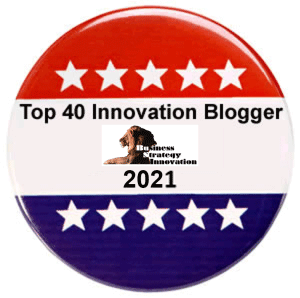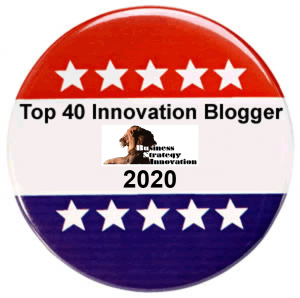I recently invested my 30 years of knowledge and skills development and experience in corporate learning in designing The Start-Up Game™ . This is a two day business simulation that enable people to learn by playing, collaborating, experimenting and learning by failing fast. My last 3 years of research into innovative thought leadership and start-up entrepreneurship also proves that people learn from experience, by “doing.” This involves playing, improvising and experimenting in ways that are seldom taught in business schools unless they have a deep vocational focus – so it is important to innovate both teaching and coaching innovation in a disruptive world. Especially as a unique way of teaching innovation in Australia.
Disrupting the corporate learning paradigm
The Start-Up Game™ is an attempt to disrupt, transform and re-invent the corporate learning paradigm by integrating adult and experiential learning with gamification processes to innovate the way innovation, entrepreneurship and intrapreneurship are taught in organizations, business schools and incubators.
I invested two years researching how to design market and teach the concepts, principles and techniques embodied in the innovative corporate learning curriculum I developed to advance leadership education globally. Additionally, I researched how to incorporate innovative new technologies involved in internet marketing and gamification processes. The result was the co-creation of a disruptive business game with a leading game design studio, in Israel. It is a collaboration between ImagineNation™ and The Playful Shark, designing a two day business simulation that enable people to learn by playing, collaborating, experimenting and learning by failing fast.
It is a profound and serious business simulation, a metaphor that uses role plays to take players through the emotional, visceral & cognitive roller-coaster that a start-up entrepreneur or corporate intrapreneur experiences when going through the four phases when creating, inventing and innovating a solution.
It creates a deeply engaging emotional, visceral & cognitive experience that enables players to understand, experiment with, practice (and fail), iterate and pivot creative ideas. To also pay attention towards developing, applying and integrating the intrinsic motivators, mindsets, behaviors & skills of innovative leadership and start-up entrepreneurship.
Its design is flexible and can be customized to align to and support the execution of each clients strategic agenda and can include their specific innovation or change dilemmas, problems, opportunities and challenges.
It was designed and developed on concrete and evidence based concepts, principles and techniques;
- Learning by being and doing
In the early 1970s, Kolb and Ron Fry developed the Experiential Learning Model (ELM) establishing an experiential approach to learning. This involves creating a concrete ‘experience’ to then enable people to then ‘reflect’ about the results (feedback) they have created. Using this feedback to reflect upon ‘what worked/doesn’t work’, to then ‘think’ about options and choices to experiment with and ‘do differently’ and thus, improve their results. They then develop a new plan to ‘act’ upon next time.
The outcome is a new and fresh way of responding to, improving and/or experimenting with the learning concepts, principles and techniques, to improve their results or business outcomes.
This approach to learning is especially relevant to the way adults learn and innovative entrepreneurs operate; because our research proves that it’s in the ‘being’ and the ‘doing’ rather than in the ‘knowing’ and it’s in the ‘practice’ rather than the ‘theory’ that ultimately ensures innovative leadership and start-up success.
- The springboard 60-30-10 formula
The Start-Up Game™ embodies this within the springboard 60-30-10 formula, which means that an Innovation Theory segment (the ‘10’) is introduced before each round, this is followed by the teams actually playing rounds one- four. Each round is followed by a group debrief discussion and a team debate on change decisions to experiment with in the next round. Teams then experiment with the desired changes (the ‘30’). Upon completion of the four rounds teams make linkages and applications to what happens in ‘real life’ (the ‘60’). This enables them to transfer the learning’s and distinctions to the workplace, to make necessary changes required to develop innovation practices and habits, therefore laying the foundations for the development of an innovation culture and business eco-system in innovation Australia.
- Simulations and role plays for experimentation
Many of us are aware that airline pilots learn how to fly in flight simulators, where they practice flying high tech aircraft in safe learning environments, where they can experiment, crash and burn and in effect learn from their failures, without blame, punishment and retribution. In fact, according to my old Aussie flat mate, a former Qantas 747 captain, now teaching Korean Airline pilots how to fly in Seoul, it is impossible to learn how to fly an aircraft without experimenting with crashing and burning (and failing) during the flight simulation process.
- Designing profound games
In a recent interview, Dr Doris C. Rusch a postdoctoral researcher at the Singapore-MIT GAMBIT Game Lab, stated that:
“One of the questions I ask myself in my research is this: how can we make profound games? It starts with basing games on abstract concepts instead of physical ones. To make abstract concepts tangible, we need metaphors. Simply put, metaphors are physical concepts that represent abstract concepts—love as a journey, rising anger as an avalanche.”
- Entrepreneurial innovation as a learning system
In 2011 Robert M. Gemmell surveyed 172 technology entrepreneurs to explore links between learning style and learning flexibility and decision making behaviours to hypothesize about what produces entrepreneurial innovation and success. This study confirms the “profound role of experimental practices” within a learning system for innovation, suggesting that “an overwhelmingly large portion of innovation performance achieved by our entrepreneurs (52%) can be explained by their hands on, iterative approach to learning and problem solving.”
Gemmell concluded that “entrepreneurs are most innovative when they utilise experimentation as a key practice without ignoring the other learning processes. Entrepreneurs will be more successful and innovative when they take time to reflect upon multiple alternatives and when they test trial ideas socially before making important decisions.” Reinforcing the power of enabling people to learn by playing, collaborating, experimenting and learning by failing fast.
- Development of gamification
Technological advances in gamification have also created innovative new ways of learning that embrace the use of experiential metaphors, which involves cleverly designing challenges that will evoke a specific reaction in the player.
– Example; an innovative way to play basketball and hockey
On the Israeli Tech River website outlines how basketball and hockey players are improving their scores by 20-40% via an online gamified software tool:
“Originally designed as a simulator for Israeli fighter pilots, IntelliGym (http://www.intelligym.com) – a patented computer software training tool – is raising the scores of basketball and hockey players by 20-40%! Until now, it was believed that players either had an innate sense of the game – game intelligence, court vision, reading plays – or they didn’t. But, thanks to this ultra-sophisticated program – a ‘brain gym’ for competitive sportsmen – it’s becoming clear that everyone can significantly improve his game”.
– Example; an innovative ways to effect revolutionary change
Fast Company recently published an article, “Can a video game about the 1979 Iranian revolution create a revolution in gaming”? Where players become participants in a revolution, transforming the gaming paradigm, “Gaming is traditionally just seen as frivolous entertainment,” creator Navid Khonsari said. “This goes beyond that and tries to engage you in real life and real stories.”
Another example of these phenomena is the online game, “PeaceMaker”, which “challenges you to succeed as a leader where others have failed. Experience the joy of bringing peace to the Middle East or the agony of plunging the region into disaster. PeaceMaker will test your skills, assumptions and prior knowledge. Play it and you will never read the news the same way again”.
- Innovative ways to teach innovative leadership, entrepreneurship and intrapreneurshiip
ImagineNation™ has developed as a generative and provocative global learning company that uses the latest technology and thought leadership to enable people and organizations to develop their innovative leadership, entrepreneurship and intrapreneurship capability.
The aim is to make innovation everyone’s job, every day to build highly engaged, courageous, experimental, emergent and passionate leaders, organizational cultures and business eco-systems to drive peak performance!
The Start-Up Game™ embodies these findings and has integrated them into a corporate learning context in the form of a one or two day live workshop. This workshop meets the needs of organizations that are seeking to utilize people and other resources in more innovative and lean ways.
It enables players to experiment with and apply four generative methodologies that involve the development of intrinsic motivators, mindsets, behaviours, skills and tools in being provocatively competent to safely:
– Challenge the process.
– Challenge convention.
– Disrupt the status quo.
– Generate paradigm shifts and inflection points.
It enables people to learn by playing, collaborating, experimenting and learning by failing fast.
The future of education
It supports and brings to life the need for a more innovative approach to tertiary and corporate education. This is reinforced by what Sramana Mitra, a Silicon Valley entrepreneur, who runs the Million by One Million Club and is a leading global innovative entrepreneurship educator, recently published “The Future of Education, 10 trends to watch”.
In this article, she suggests that we need a wide range of low cost, accessible and entertaining learning and vocational programs that attract and engage students to not only build new technologies, but also new companies. Shifting the education process from ‘sage on stage’ to ‘guide on side’ in a variety of media and incubator centric free ways that penetrate throughout society.
The Start-Up Game is a first step serious, researched educational and vocational innovation in this space, involving a two day business simulation that enables people to learn by playing, collaborating, experimenting and learning by failing fast.
At ImagineNation™ we provide innovation coaching, education and culture consulting to help businesses achieve their innovation goals. Because we have done most of the learning and actioning of new hybrid mindsets, behaviors and skill-sets already, we can help your businesses also do this by opening people up to their innovation potential.
Contact us now at janet@imaginenation.com.au to find out how we can partner with you to learn, adapt and grow your business in the digital age.











